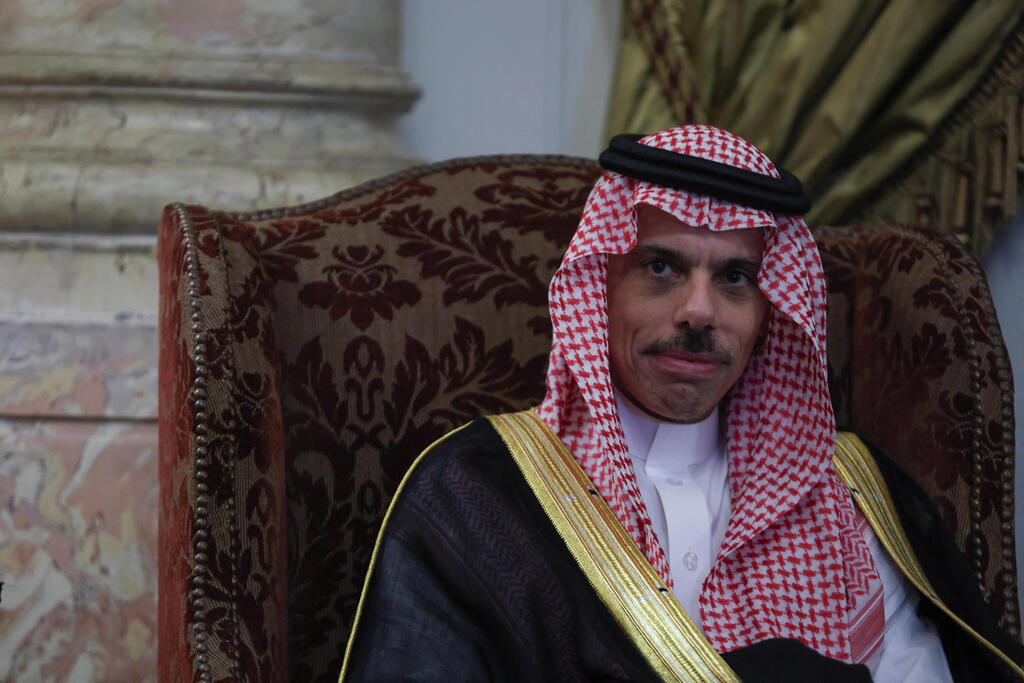Getting your Trinity Audio player ready...
Saudi Foreign Minister Faisal bin Farhan Al-Saud articulated in the Financial Times why Riyadh paused its normalization with Israel, which was nearly finalized before October 7. He emphasized the urgent need for an immediate ceasefire in Gaza, warning of the region's dangerous escalation and the necessity for "courage and leadership" to forge a sustainable peace amidst the devastation and despair. He declared, "The time has come to embark on an irreversible path to a solution, culminating in two states—Palestinian and Israeli—living side by side."
Farhan underscored Saudi Arabia's enduring commitment to resolving the conflict, noting Crown Prince Mohammed bin Salman's strong condemnation of Israel's actions. "Saudi Arabia will tirelessly work towards establishing an independent Palestinian state with East Jerusalem as its capital and will not establish diplomatic relations with Israel without this condition," he wrote.
He stressed that an independent Palestinian state, in Saudi Arabia's view, would provide regional stability, integration, and prosperity. "A two-state solution is not merely an ideal; it is the only viable path to ensuring Palestine, Israel and the region’s long-term security," he argued. "Uncontrolled escalatory cycles are the building blocks of wider war. In Lebanon, we are witnessing this first hand. Peace cannot be built on a foundation of occupation and resentment; true security for Israel will come from recognizing the legitimate rights of the Palestinian people."
Farhan noted that the barriers to peace are not the "It is essential to understand that the true obstacles to peace are not the Palestinians and Israelis who yearn for stability and coexistence, but rather the radicals and warmongers on both sides who reject a just resolution and seek to spread this conflict across our region and beyond."
He emphasized the importance of a PA-administered civilian control of Gaza: "We have witnessed the perseverance of the Palestinian Authority in maintaining calm in the occupied West Bank despite unrelenting obstacles. Its commitment to non-violence and co-operation must be supported. A lasting resolution cannot be achieved without both Gaza and the occupied West Bank being under PA control."
He further argued that Israel's interest are not as benign as it claims, supposedly more interested in offense than defense. "It has been clear for too long that self-defence is not Israel’s primary goal in this war. Instead, it seems the objective is to eliminate the conditions for life with any modicum of dignity for decades to come. By continuing the assault on Gaza that has killed over 40,000, according to Palestinian health officials, and displaced almost 2mn, expanding settlements in the occupied West Bank and imposing movement restrictions, Israel creates a reality that diminishes prospects for a sovereign Palestinian state.
"Merely recognizing Palestine is not enough. We must demand more accountability in line with International Court of Justice opinions. This includes the implementation of UN resolutions, the imposition of punitive measures against those that work to undermine Palestinian statehood and incentives for those who support it."
"A global alliance of UN member states and international organizations now supports diplomatic efforts for a permanent ceasefire, the release of hostages and detainees, and addressing the humanitarian suffering of Gaza's residents," he added. "This alliance will seek to advance concrete measures to uphold international law, end the occupation, and realize the two-state solution on a clear timeline.
"Palestinian statehood is a prerequisite for peace, rather than its byproduct. This is the only path that can lead us out of this cycle of violence and into a future where both Israelis and Palestinians can live in peace, with security and mutual respect. Let us not delay any longer."




